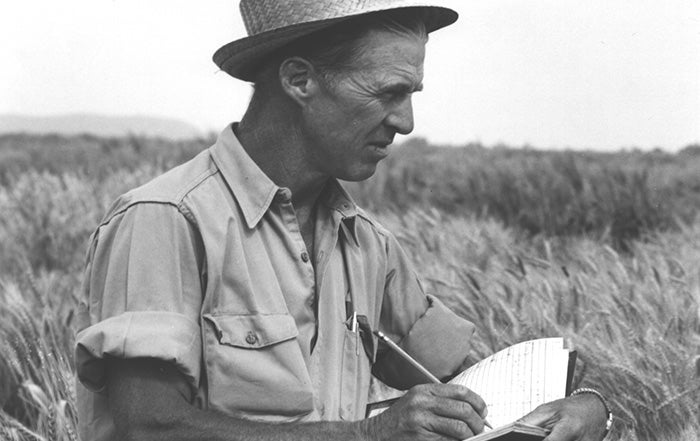In honor of what would be his 105th birthday on March 25, 2019, we celebrate the founder of The World Food Prize and the inspiration his legacy still provides the next generation in agriculture.
Before he earned accolades for his work to end world hunger, Norman E. Borlaug was a farm kid from Iowa. The agronomist and humanitarian traveled the world in pursuit of pioneering work in global agriculture.
In 1944, while working as a research scientist in Mexico, Borlaug developed successive generations of wheat varieties that helped local farmers improve wheat cultivation. These new varieties and improved wheat-production methods were later adopted around the world. His efforts to transform agriculture to prevent hunger earned Borlaug the Nobel Peace Prize in 1970.
Borlaug wanted to inspire others to join the fight against global food insecurity. In 1986, he founded The World Food Prize. A $250,000 annual award honors those who have made significant strides in areas ranging from plant and animal science and soil health to natural resource conservation and water use. Laureates from around the world have been honored with The World Food Prize.
Isabella Culotta, who joined FFA as a high school senior in Ithaca, N.Y., learned about The World Food Prize through her FFA chapter and won a scholarship to attend The World Food Prize Foundation Global Youth Institute in 2016.
At the event, Culotta met both World Food Prize laureates and FFA members who shared her passion for addressing global food and water issues.
“The World Food Prize brings together people from all over the world to innovate and share their experiences, which is important for coming up with solutions,” she recalls.
Culotta was inspired and applied for a Borlaug-Ruan International Internship, which she received, and spent two months in Nepal working at the International Centre for Integrated Mountain Development.
Now that she is back in the U.S., Culotta is majoring in international agriculture and rural development at Cornell University. She credits her experience with The World Food Prize — and the inspirational legacy of Borlaug, who passed 10 years ago in 2009 but would have celebrated his 105th birthday on March 25 — with helping shape her vision for the future.
“It helped me connect the dots between the social sciences and STEM fields, which helped me realize I wanted to get a better understanding of the science aspect [of agriculture],” Culotta explains. “I also learned that despite all of the big names and titles in the room, people wanted to hear what the next generation had to say.”












